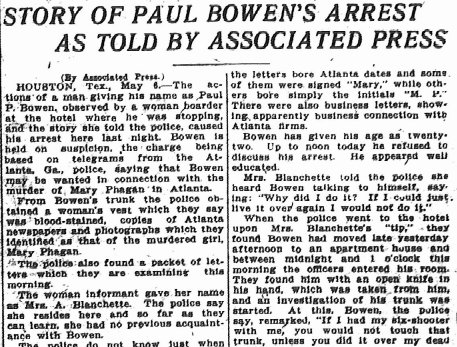Another in our series of new transcriptions of contemporary articles on the Leo Frank case.
Atlanta Journal
Tuesday, May 6th, 1913
The actions of a man giving his name as Paul P. Bowen, observed by a woman boarder at the hotel where he was stopping, and the story she told the police, caused his arrest here last night. Bowen is held on suspicion, the charge being based on telegrams from the Atlanta, Ga., police, saying that Bowen may be wanted in connection with the murder of Mary Phagan in Atlanta.
From Bowen’s trunk the police obtained a woman’s vest which they say was blood-stained, copies of Atlanta newspapers and photographs which they identified as that of the murdered girl, Mary Phagan.
The police also found a packet of letters which they are examining this morning.
The woman informant gave her name as Mrs. A. Blanchette. The police say she resides here and so far as they can learn, she had no previous acquaintance with Bowen.
The police do not know just when Bowen arrived in Houston. On Sunday he registered at the hotel where Mrs. Blanchette stopped and occupied a room adjoining her. She says her attention was attracted by hearing a man sobbing in the adjoining room, and that by standing on a chair she looked through a transom at Bowen while he opened his trunk.
She told the police his actions had aroused her suspicion.
Acting on her information they arrested Bowen.
He was put through a searching questioning by Chief of Police Davison and other officers this forenoon.
They declined to allow any one else to question him, and were reticent about giving out information.
LETTERS SIGNED “MARY.”
The police announced later that they would hold Bowen and the contents of his trunk pending the arrival of officers from Atlanta. They said that many of the letters bore Atlanta dates and some of them were signed “Mary,” while others bore simply the initials “M. P.” There were also business letters, showing apparently business connection with Atlanta firms.
Bowen has given his age as twenty-two. Up to noon today he refused to discuss his arrest. He appeared well educated.
Mrs. Blanchette told the police she heard Bowen talking to himself, saying: “Why did I do it? If I could just live it over again I would not do it.”
When the police went to the hotel upon Mrs. Blanchette’s “tip,” they found Bowen had moved late yesterday afternoon to an apartment house and between midnight and 1 o’clock this morning the officers entered his room. They found him with an open knife in his hand, which was taken from him, and an investigation of his trunk was started. At this, Bowen, the police say, remarked, “If I had my six-shooter with me, you would not touch that trunk, unless you did it over my dead body.”
MAKES VIGOROUS DENIAL.
Bowen this afternoon said he had been a bookkeeper and stenographer and claimed that he worked in Atlanta, Ga., for the Morrow Transfer company. He gave his home address at 108 Ivy street, that city.
He has worked in several places in Georgia, Arkansas, Louisiana and Texas, he says, but in what trade he would not state.
He denies knowing anything about the pencil factory, any persons connected with or employed in the factory. He said he did not know the Phagan girl. His trunk contained dozens of pictures of young ladies, singly and in groups. Letters from several young women are among his effects.
He positively declined to discuss the bloody vest, papers, letters or photographs, maintaining silence when asked about them.
* * *
Atlanta Journal, May 6th 1913, “Story of Paul Bowen’s Arrest as Told by Associated Press,” Leo Frank case newspaper article series (Original PDF)

